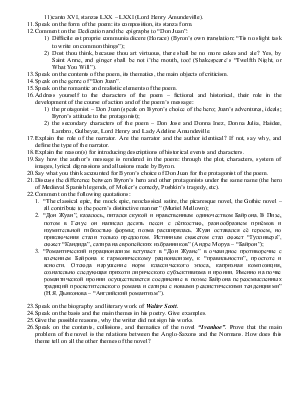

SEMINAR ON THE PRE-ROMANTICISM AND ROMANTICISM
IN ENGLISH LITERATURE
(Robert Burns – poems; G. G. Byron – “Don Juan”; W. Scott – “Ivanhoe”)
1. Speak on the peculiar features of the Pre-Romanticism and Romanticism in English literature (the general historical and cultural development at this time). Dwell on the atmosphere in the European society after the French Bourgeois Revolution of 1789 – 1794.
2. Give a general outline of the periods, main genres and groups of writers of the time. Enlarge on the features characteristic of English literature of the time and be ready to trace them while analyzing the works of English Romantic writers.
3. Enumerate the main representatives in English literature of the period. Point out the principal differences between the three groups of writers belonging to the period of English Romanticism. Recall the names of the most remarkable representatives of the Romantic period in France, Germany, Russia, and Belarus.
4. Speak on the biography and literary work of Robert Burns as a poet whose literary work might be regarded as a link between the Enlightenment and the Romanticism.
5. Speak on the basis and the main themes in his poetry. Give examples.
6. What are the peculiar features of his poetry, his language? Prove your ideas with the help of examples.
7. Give an overview of Byron’slife and literary work. Consider the following items:
1) biographical data and the periods of creative work;
2) the genres of his works;
3) contradictions of the poet’s outlook and aesthetic principles;
4) Byron’s influence on European literature.
8. Make a list of Byron’s major works. Separate them into the following genres:
1) epic / lyric poems;
2) romantic dramas;
3) political satires;
4) non-fiction.
Name those works that are the most important for this or that period of his literary work.
9. Look up the definitions of the following forms:
1) canto;
2) ottava rima;
3) allusion;
4) Don Juan myth (which appeared in Spanish literature);
5) epic novel;
6) romantic irony / satire.
10. As you read “Don Juan”,pay attention to the following stanzas. Use these stanzas (and / or those you pick up yourself and consider important) to support you arguments while discussing some further items given in this section:
1) dedication, stanzas I – II, IV – V (Byron’s polemics against his poetic rivals – the Lake Poets);
2) canto I, stanzas I, V (the choice of the hero);
3) canto I, stanzas VIII, IX – X, XII, ХШ, XVI, XVII, XIX – XX, XXV, XXVII – XXVIII, XLIX – LI (education and upbringing of Don Juan);
4) canto I, stanzas XXVI – XXVIII (family relations);
5) canto I, stanzas ССП – ССШ (Byron’s concern for verisimilitude);
6) canto VIII, stanzas L – LI, CXXXV – CXXXVIII (revolution);
7) canto X, stanzas XXI – XXII (the court of Empress Catherine in St. Petersburg);
8) canto X stanzas LXVI – LXVIII (Britain);
9) canto XII, stanzas V – VI (power of money);
10) canto ХIII, stanzas LXXIX, LXXXVII – LXXXVIII (London high society);
11) canto XVI, stanzas LXX – LXXI (Lord Henry Amundeville).
11. Speak on the form of the poem: its composition, its stanza form.
12. Comment on the Dedication and the epigraphs to “Don Juan”:
1) Difficile est proprie communia dicere (Horace) (Byron’s own translation: “Tis no slight task to write on common things”);
2) Dost thou think, because thou art virtuous, there shall be no more cakes and ale? Yes, by Saint Anne, and ginger shall be not i’the mouth, too! (Shakespeare’s “Twelfth Night, or What You Will”).
13. Speak on the contents of the poem, its thematics, the main objects of criticism.
14. Speak on the genre of “Don Juan”.
15. Speak on the romantic and realistic elements of the poem.
16. Address yourself to the characters of the poem – fictional and historical, their role in the development of the course of action and of the poem’s message:
1) the protagonist – Don Juan (speak on Byron’s choice of the hero; Juan’s adventures, ideals; Byron’s attitude to the protagonist);
2) the secondary characters of the poem – Don Jose and Donna Inez, Donna Julia, Haidee, Lambro, Gulbeyaz, Lord Henry and Lady Adeline Amundeville.
17. Explain the role of the narrator. Are the narrator and the author identical? If not, say why, and define the type of the narrator.
18. Explain the reason(s) for introducing descriptions of historical events and characters.
19. Say how the author’s message is rendered in the poem: through the plot, characters, system of images, lyrical digressions and allusions made by Byron.
20. Say what you think accounted for Byron’s choice of Don Juan for the protagonist of the poem.
21. Discuss the difference between Byron’s hero and other protagonists under the same name (the hero of Medieval Spanish legends, of Molier’s comedy, Pushkin’s tragedy, etc).
22. Comment on the following quotations:
23. Speak on the biography and literary work of Walter Scott.
24. Speak on the basis and the main themes in his poetry. Give examples.
25. Give the possible reasons, why the writer did not sign his works.
26. Speak on the contents, collisions, and thematics of the novel “Ivanhoe”. Prove that the mainproblem of the novel is the relations between the Anglo-Saxons and the Normans. How does this theme tell on all the other themes of the novel?
Уважаемый посетитель!
Чтобы распечатать файл, скачайте его (в формате Word).
Ссылка на скачивание - внизу страницы.